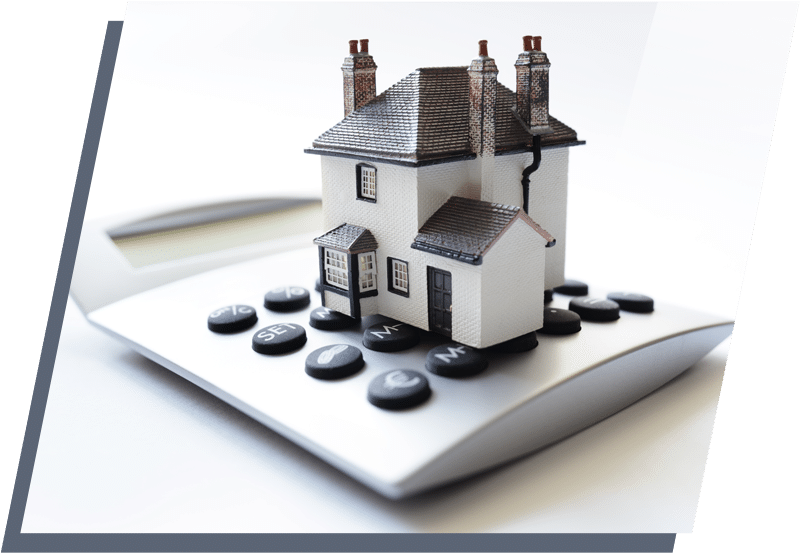Why and When to Refinance Your Mortgage
Whether you’re looking to secure a lower interest rate, switch from a fixed to a variable rate, or tap into your home equity, refinancing is an option many homeowners will explore at least once in their lives. However, there are many factors you should consider before proceeding.
To help you prepare for this next step, we’ll walk you through the refinancing process, while outlining everything you need to know in order to make an informed decision regarding your mortgage.
Download Guide (PDF)What is Refinancing?
Refinancing refers to the process of renegotiating your existing mortgage loan agreement, either during or at the end of its term. Essentially, you will be replacing your existing mortgage with a new one that offers different terms. This can be done either with the same lender or a new one.
What Happens When You Refinance a Mortgage? How Does It Work?
Refinancing refers to the process of renegotiating your existing mortgage loan agreement, either during or at the end of its term. Essentially, you will be replacing your existing mortgage with a new one that offers different terms. This can be done either with the same lender or a new one.
The process of refinancing is similar to that of obtaining a mortgage in the first place.
You will typically start by meeting with a mortgage broker who will shop around and present you with interest rates and terms with various mortgage lenders. They will be able to guide you in the right direction and help you determine whether you should re-negotiate with your lender at the end of your term, switch to a new lender, or break your mortgage mid-term to move to a new lender.
With any of these options, you will need to submit an application and provide updated documentation related to your finances, income, credit history, and more.
Below, we will delve deeper into the different ways you can refinance.
Why and When to Refinance Your Mortgage

Whether you’re looking to secure a lower interest rate, switch from a fixed to a variable rate, or tap into your home equity, refinancing is an option many homeowners will explore at least once in their lives. However, there are many factors you should consider before proceeding.
To help you prepare for this next step, we’ll walk you through the refinancing process, while outlining everything you need to know in order to make an informed decision regarding your mortgage.
Download Guide (PDF)What is Refinancing?
Refinancing refers to the process of renegotiating your existing mortgage loan agreement, either during or at the end of its term. Essentially, you will be replacing your existing mortgage with a new one that offers different terms. This can be done either with the same lender or a new one.
What Happens When You Refinance a Mortgage? How Does It Work?
Refinancing refers to the process of renegotiating your existing mortgage loan agreement, either during or at the end of its term. Essentially, you will be replacing your existing mortgage with a new one that offers different terms. This can be done either with the same lender or a new one.
The process of refinancing is similar to that of obtaining a mortgage in the first place.
You will typically start by meeting with a mortgage broker who will shop around and present you with interest rates and terms with various mortgage lenders. They will be able to guide you in the right direction and help you determine whether you should re-negotiate with your lender at the end of your term, switch to a new lender, or break your mortgage mid-term to move to a new lender.
With any of these options, you will need to submit an application and provide updated documentation related to your finances, income, credit history, and more.
Below, we will delve deeper into the different ways you can refinance.
Breaking Your Mortgage Contract
Meet with your lender or mortgage broker to discuss breaking your mortgage contract before the end of your term. After you break your mortgage with your current lender, you can move to a new lender and secure a different mortgage with a different rate and terms. This option typically requires you to pay a penalty. More on this later.
Switch to a New
Lender at the End of Your Term
You also have the option of waiting until your contract is up for renewal and shopping around for a better rate with a new lender. With this option, you can avoid paying a penalty for breaking your mortgage early.
Negotiate at the End of Your Term
If you wish to secure a better interest rate but don’t wish to change lenders, you can renegotiate your mortgage agreement with your lender at the end of your term.
Open a Home Equity Line of Credit
A Home Equity Line of Credit (HELOC) allows you to borrow funds against the equity in your home. However, instead of receiving these funds all at once, you will get access to a revolving line of credit that allows you to borrow money as you need it. This can be done with your current lender or a new one.
Blending and Extending Your Mortgage
Another refinancing option offered by many lenders is combining your current mortgage rate with the current market rates and extending your term.
Here’s an example of what this looks like:
You are two years into a five-year fixed rate term and are paying an interest rate of 5%. You find out that your lender is now offering a rate of 3% to new borrowers, so you request a new blended interest rate, which will fall in between 3% and 5%. Your term will also be reset, so that you now have five years remaining on your term rather than three.
The benefit of this option is that you receive a lower interest rate and avoid breaking your mortgage
early and paying a penalty.
Breaking Your Mortgage Contract
Meet with your lender or mortgage broker to discuss breaking your mortgage contract before the end of your term. After you break your mortgage with your current lender, you can move to a new lender and secure a different mortgage with a different rate and terms. This option typically requires you to pay a penalty. More on this later.
Switch to a New Lender at the End of Your Term
You also have the option of waiting until your contract is up for renewal and shopping around for a better rate with a new lender. With this option, you can avoid paying a penalty for breaking your mortgage early.
Negotiate at the End of Your Term
If you wish to secure a better interest rate but don’t wish to change lenders, you can renegotiate your mortgage agreement with your lender at the end of your term.
Open a Home Equity Line of Credit
A Home Equity Line of Credit (HELOC) allows you to borrow funds against the equity in your home. However, instead of receiving these funds all at once, you will get access to a revolving line of credit that allows you to borrow money as you need it. This can be done with your current lender or a new one.
Blending and Extending Your Mortgage
Another refinancing option offered by many lenders is combining your current mortgage rate with the current market rates and extending your term.
Here’s an example of what this looks like:
You are two years into a five-year fixed rate term and are paying an interest rate of 5%. You find out that your lender is now offering a rate of 3% to new borrowers, so you request a new blended interest rate, which will fall in between 3% and 5%. Your term will also be reset, so that you now have five years remaining on your term rather than three.
The benefit of this option is that you receive a lower interest rate and avoid breaking your mortgage early and paying a penalty.

Why Should You Refinance?
There are many reasons you may decide to refinance, the most common being:
To Consolidate Debt
If you have high-interest consumer credit debt, you may be able to consolidate this with your mortgage through refinancing if you have enough equity in your home.
In this situation, it is likely ideal for a borrower to refinance, as it can save you money from an interest cost perspective. Furthermore, refinancing can help you restructure your cash flow situation, so that your overall debt obligations are smaller each month. This allows for a more manageable monthly cash output.
Here is an example of what this may look like. Let’s say you are able to refinance two car loans and a credit card into your mortgage. Your new mortgage payment will be similar to what it was before, and you no longer have to worry about car payments and credit card payments, as they are now imbedded in your mortgage loan.
To Secure a Lower Interest Rate
One of the most common reasons for refinancing a mortgage is to secure a lower interest rate. At the end of your term, you may find that interest rates have dropped, giving you the opportunity to shop around for a better rate in order to lower your monthly payments.
To Access Your Home’s Equity
Through refinancing, you are often able to access up to 80% of your home’s value, minus the outstanding balance of your mortgage.
This money can be used for large purchases or investments, such as a child’s education, home renovations, or an investment property.
Why Should You Refinance?
There are many reasons you may decide to refinance, the most common being:
To Consolidate Debt
If you have high-interest consumer credit debt, you may be able to consolidate this with your mortgage through refinancing if you have enough equity in your home.
In this situation, it is likely ideal for a borrower to refinance, as it can save you money from an interest cost perspective. Furthermore, refinancing can help you restructure your cash flow situation, so that your overall debt obligations are smaller each month. This allows for a more manageable monthly cash output.
Here is an example of what this may look like. Let’s say you are able to refinance two car loans and a credit card into your mortgage. Your new mortgage payment will be similar to what it was before, and you no longer have to worry about car payments and credit card payments, as they are now imbedded in your mortgage loan.
To Secure a Lower Interest Rate
One of the most common reasons for refinancing a mortgage is to secure a lower interest rate. At the end of your term, you may find that interest rates have dropped, giving you the opportunity to shop around for a better rate in order to lower your monthly payments.
To Access Your Home’s Equity
Through refinancing, you are often able to access up to 80% of your home’s value, minus the outstanding balance of your mortgage.
This money can be used for large purchases or investments, such as a child’s education, home renovations, or an investment property.

When Should You Refinance?
The ideal time to refinance is typically at the end of your mortgage term. If you are at the end of your term and are thinking about refinancing, consider the following factors:
- Your interest rate is higher than the current average rate
- You have high interest debt you are looking to consolidate
- You are in need of cash for a large investment and would like to access your equity
When’s the Best and Worst Time to Do So?
When it comes time to refinance, it’s usually best to wait until the end of your term. Should you refinance in the middle of your term, you may be subject to a discharge fee and prepayment penalty. However, it may still be beneficial to break the contract mid term. Speak with your mortgage broker to see what penalty you may face for breaking your mortgage early and if it would be beneficial to do so.
Does Refinancing Hurt my Credit Score?
Like any mortgage application, refinancing involves certain actions that can affect your credit score. This includes:
- A credit check
- Closing an account
However, the impact is typically minimal, unless you’re frequently refinancing and/or applying for other types of new credit.
Those with high credit scores and longer credit histories will likely be less affected, while those with a lower credit score and shorter credit history may see a bigger impact.
How Long Will It Take to Refinance A Mortgage?
Generally speaking, refinancing a mortgage typically takes two to four weeks. However, certain factors, such as the property valuation, can slow down the process.
Key Considerations When Thinking About Refinancing
Penalties
Often, refinancing requires you to break your mortgage before the term is up, which means you may be subject to a penalty.
Typically, the penalty for variable rate mortgages is three months’ interest. For fixed-rate mortgages, the penalty is often an Interest Rate Differential (IRD).
This IRD penalty is determined by calculating the difference between your existing interest rate and
the current rate being charged by your lender.
Often though, refinancing can save you a significant amount of money, so the penalty may be worth it.
How Much Equity You Have
Most lenders will require you to have at least 20 per cent equity in your home.
Fees
As previously mentioned, by moving your mortgage to a new lender before the end of your term,
you will likely be required to pay a discharge fee. Each lender and province sets its own fees,
though they typically range between $200 and $350.
When Should You Refinance?
The ideal time to refinance is typically at the end of your mortgage term. If you are at the end of your term and are thinking about refinancing, consider the following factors:
- Your interest rate is higher than the current average rate
- You have high interest debt you are looking to consolidate
- You are in need of cash for a large investment and would like to access your equity
When’s the Best and Worst Time to Do So?
When it comes time to refinance, it’s usually best to wait until the end of your term. Should you refinance in the middle of your term, you may be subject to a discharge fee and prepayment penalty. However, it may still be beneficial to break the contract mid term. Speak with your mortgage broker to see what penalty you may face for breaking your mortgage early and if it would be beneficial to do so.
Does Refinancing Hurt my Credit Score?
Like any mortgage application, refinancing involves certain actions that can affect your credit score. This includes:
- A credit check
- Closing an account
However, the impact is typically minimal, unless you’re frequently refinancing and/or applying for other types of new credit.
Those with high credit scores and longer credit histories will likely be less affected, while those with a lower credit score and shorter credit history may see a bigger impact.

How Long Will It Take to Refinance A Mortgage?
Generally speaking, refinancing a mortgage typically takes two to four weeks. However, certain factors, such as the property valuation, can slow down the process.
Key Considerations When Thinking About Refinancing
Penalties
Often, refinancing requires you to break your mortgage before the term is up, which means you may be subject to a penalty.
Typically, the penalty for variable rate mortgages is three months’ interest. For fixed-rate mortgages, the penalty is often an Interest Rate Differential (IRD).
This IRD penalty is determined by calculating the difference between your existing interest rate and the current rate being charged by your lender.
Often though, refinancing can save you a significant amount of money, so the penalty may be worth it.
How Much Equity You Have
Most lenders will require you to have at least 20 per cent equity in your home.
Fees
As previously mentioned, by moving your mortgage to a new lender before the end of your term, you will likely be required to pay a discharge fee. Each lender and province sets its own fees, though they typically range between $200 and $350.
The Current Housing Market
When calculating how much equity you have, keep in mind that if your home’s value has increased since you purchased it, your equity will increase too .
Let’s say you purchased your home for $250,000. Years later, your home is appraised for $300,000 and you have $150,000 remaining on your mortgage. This sets your equity at $150,000. If your home value had remained the same, you would only have $100,000 in equity. By refinancing, you’ll be able to access this larger amount of equity.
Also consider the current mortgage interest rate market trend. If average rates are fairly low, now would be a good time to refinance. But, if rates are higher than what you currently have, you may want to avoid refinancing at this time. A mortgage broker can help you come to a decision based on the current market.
For many, refinancing can be an exciting time. In many instances, you will receive a lowered interest rate that can save you thousands of dollars over time. Or, you’ll be tapping into your home equity and receiving a big influx of cash that can be used towards home renovations, your children’s education, or even a family vacation. In any case, always seek advice from your mortgage broker, who will be able to guide you in the right direction and find you a new mortgage that meets your current and future needs.
Contact the Chris Allard Mortgage Team Today!
Contact Chris Allard TodayHow Long Will It Take to Refinance A Mortgage?
Generally speaking, refinancing a mortgage typically takes two to four weeks. However, certain factors, such as the property valuation, can slow down the process.
Key Considerations When Thinking About Refinancing
Penalties
Often, refinancing requires you to break your mortgage before the term is up, which means you may be subject to a penalty.
Typically, the penalty for variable rate mortgages is three months’ interest. For fixed-rate mortgages, the penalty is often an Interest Rate Differential (IRD).
This IRD penalty is determined by calculating the difference between your existing interest rate and the current rate being charged by your lender.
Often though, refinancing can save you a significant amount of money, so the penalty may be worth it.
How Much Equity You Have
Most lenders will require you to have at least 20 per cent equity in your home.
Fees
As previously mentioned, by moving your mortgage to a new lender before the end of your term, you will likely be required to pay a discharge fee. Each lender and province sets its own fees, though they typically range between $200 and $350.
The Current Housing Market
When calculating how much equity you have, keep in mind that if your home’s value has increased since you purchased it, your equity will increase too .
Let’s say you purchased your home for $250,000. Years later, your home is appraised for $300,000 and you have $150,000 remaining on your mortgage. This sets your equity at $150,000. If your home value had remained the same, you would only have $100,000 in equity. By refinancing, you’ll be able to access this larger amount of equity.
Also consider the current mortgage interest rate market trend. If average rates are fairly low, now would be a good time to refinance. But, if rates are higher than what you currently have, you may want to avoid refinancing at this time. A mortgage broker can help you come to a decision based on the current market.
For many, refinancing can be an exciting time. In many instances, you will receive a lowered interest rate that can save you thousands of dollars over time. Or, you’ll be tapping into your home equity and receiving a big influx of cash that can be used towards home renovations, your children’s education, or even a family vacation. In any case, always seek advice from your mortgage broker, who will be able to guide you in the right direction and find you a new mortgage that meets your current and future needs.
Contact the Chris Allard Mortgage Team Today!
Contact Chris Allard Today

